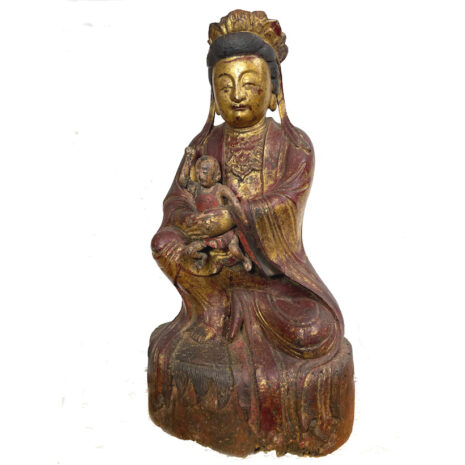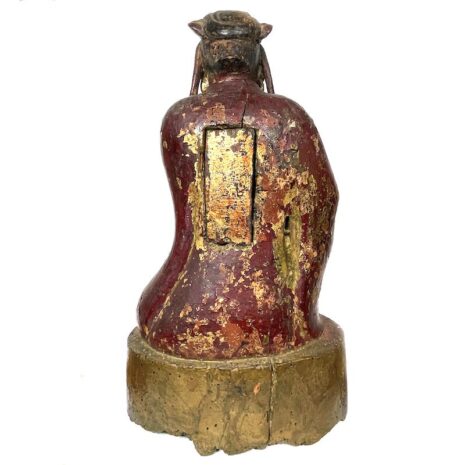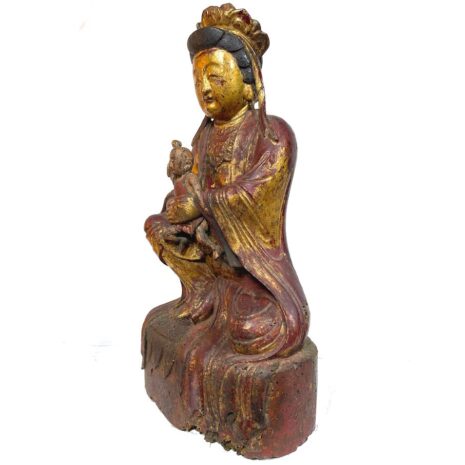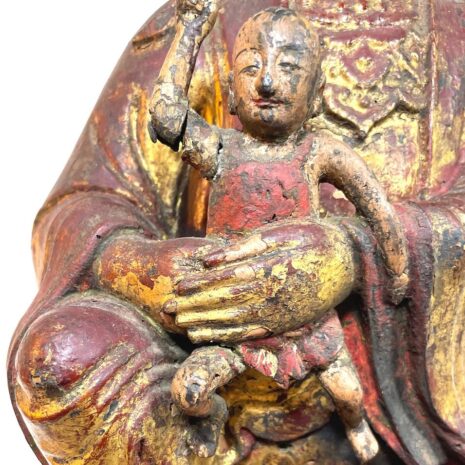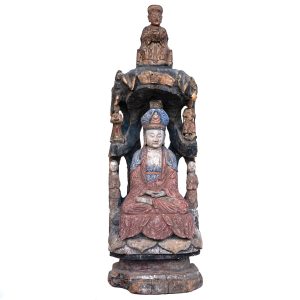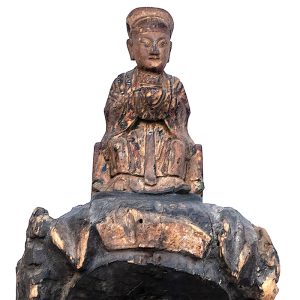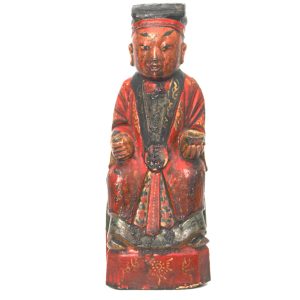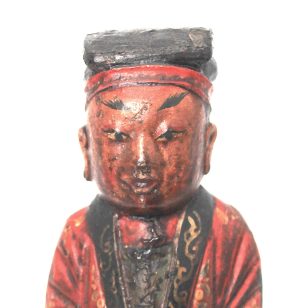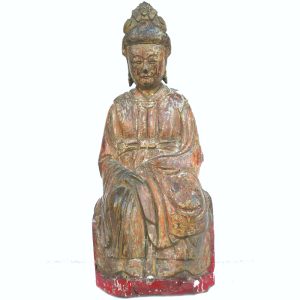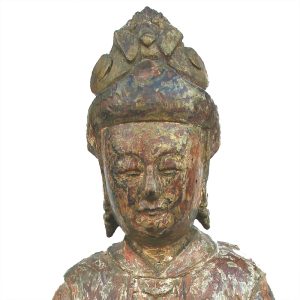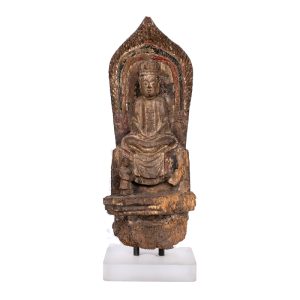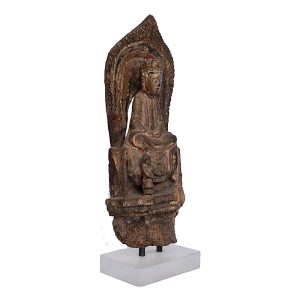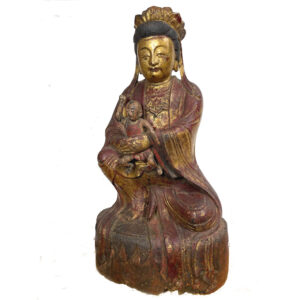Antique Songzi Guanyin, Bestower of Children, China (16311XOKE) $2650 SPECIAL PRICE
Original price was: $2,650.00.$2,150.00Current price is: $2,150.00.
H: 14.5” W: 8.25” D: 5” | FOR SHIPPING INFORMATION CONTACT US AT 213-568-3030
This beautiful Guanyin is carved in the rural provincial tradition: a modest, compassionate and humble deity with a simple “crown” of lotus leaves holding and unadorned robe with flowing sleeves extended to her plain pedestal lined with simple leaves. Her face is extremely empathetic with a slight smile as she tenderly grasping her child who resembles the infant Buddha. Given its size and elegance it was probably on a home altar of a well to do couple desirous of having a (male) baby.
Description
During the Ming and Qing Dynasties, the cult of Songzi (“Child Giving”) Guanyin, the Buddhist bodhisattva of compassion, became one of the most popular religious movements especially among Popular Religion and Taoist female and male devotees. It reached all Chinese regions and social strata and included the upper classes, court figures and the literati as well as the peasant classes. She holds a child in her lap symbolizing her many roles of granting and raising children: she watches over women and children during pregnancy and childbirth, prevents premature illness or death of mother or child and protects children after birth. The Lotus Sutra states a woman wishing a male child need only to pray and provide offerings to the bodhisattva Avalokiteshvara, and she will be granted a son. Confucian beliefs greatly affected the iconology of Songzi Guanyin. When Buddhism arrived in China and became Mahayana Buddhism, male Avalokiteshvara became the female bodhisattva Guanyin. Songzi Guanyin reflected on the Confucian conviction that women should not seek solace from male deities especially in requests for off-spring. Holding a male child emphasized that a woman’s most important role is to produce male heirs. During the later Ming the cult of Guanyin as the giver of children became predominant; before then Guanyin rarely held a child in her lap. After Christian missionaries arrived in China during the 15-17th centuries and commissioned local artisans to carve Virgin and Child images, Songzi images began to resemble Virgin Mary holding baby Jesus. In this large impressive provincial image, she sits in modified lalitsana. the position of royal ease, wearing deeply carved elegant robes that flow over her pedestal, a multi-lobed crown of stylized lotus leaves covered with gilt and red pigment, and pendulous ears indicating her regal and enlightened status. The red color of fu (blessings) and gilt on front and back are wishes for good luck and prosperity. Her elegant hands caress the child on her lap who mirrors the posture of the infant Buddha immediately after birth with his right hand up and his left pointing down. The statue is in very good condition with most of its original gilt, pigmentation and lacquer covering the front and back. There are expected surface losses, small cracks and old stabilized insect damage and the child’s arm has been glued together in more recent times. As many Buddhist statues were lost or damaged during China’s modernization, this remarkable and beautiful statue is rare and in very fine condition. This home altar image was consecrated by a monk and sealed with its original flat cover.
Click here for the Blog Consecrating Wooden Images to Imbue Them with A Life Force
Sources
John Blofeld, Bodhisattva of Compassion: The Mystical Tradition of Kuan Yin, Denver, Shambala Publications, 1978.
Buddha Dharma Education Association, Popular Deities in Chinese Buddhism, buddhanet
Lee Irwin, “Divinity and Salvation: The Great Goddesses of China,” in Asian Folklore Studies, Indiana University, Vol. 49, 1990, pp 53-68.
Eloise Hart, “Kuan Yin: Goddess of Mercy, Friend of Mankind,” Sunrise Magazine, December, 1984/January, 1985.
Chun-Fang Yu, Kuan-yin: The Chinese Transformation of Avalokitesvara, New York, Columbia University Press, 2001.
Marsha Weidner, “Beyond the Monastery Walls: Professional Painters and Popular Themes, in Latter Days of the Law: Images of Chinese Buddhism 850-1850, Honolulu, University of Hawaii Press, 1994
Additional information
| Period | Antique, Qing Dynasty |
|---|---|
| Date | 18-19th Century |
| Materials and Technique | Wood |
| Dimensions (inches) | Ht: 14.5” W: 8.25” D: 5” |
| Dimensions (metric) | Ht: 36.83cm W: 20.95cm D: 12.7cm |
| Weight | 3 lbs 9oz |
| Condition | Very good, see description |
| Item Number | 16311XOKE |
| Shipping Box Size | This item is oversized. Call 213-568-3030 for shipping cost. |

